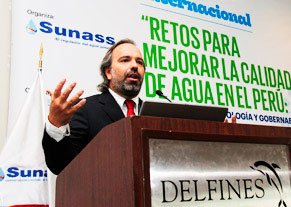- ON THE DECADE
- THE DECADE'S CAMPAIGN
- REPORTING ON PROGRESS
- THE DECADE'S PROGRAMMES
- FOCUS AREAS
-
- Access to sanitation
- Financing water
- Gender and water
- Human right to water
- Integrated Water Resources Management
- Transboundary waters
- Water and cities
- Water and energy
- Water and food security
- Water and sustainable development
- Water and the green economy
- Water cooperation
- Water quality
- Water scarcity
- FOCUS REGIONS
- RESOURCES FOR
- UN e-RESOURCES
2015 UN-Water Annual International Zaragoza Conference. Water and Sustainable Development: From Vision to Action. 15-17 January 2015
Interviewing Luis Simas, The Water and Waste Services Regulation Authority, Water Quality Department, Portugal
Luis Simas, The Water and Waste Services Regulation Authority, Water Quality Department, Portugal

What are your expectations for the Zaragoza Conference for helping in the implementation of the water related SDGs?
Our main expectation is to see if the Portuguese experience can somehow help other countries to achieve a good level of drinking water quality. We all agree that drinking water quality is crucial in developing societies since this makes a major contribution to human health. In fact, without a healthy society the children won’t grow, the workers will miss their working days and the economy will go slower. Slow economy means less development and less development means worse life conditions for everyone.
Another reason for sharing our experience is to return all the knowledge that we have gained by listening to others in the last decade, implementing some of their solutions, thinking about some of their opinions. Looking at the international scene was one of our major drivers to guarantee that now you can safely drink tap water everywhere in Portugal.
What are the main challenges for implementing sustainable water for all?
In this challenge we can’t forget the human right to safe water and sanitation, which means that this right must be universal. But we have to be careful, because universal doesn’t mean ‘free’, it means ‘affordable, accessible, with the proper quality and without any kind of discrimination’. How to achieve this is really a challenge for all countries without exception.
So you have to find a model that guarantees at the same time the sustainability of the water utilities and an affordable high quality of service for the consumers. We believe that a knowledgeable independent regulation can achieve this balance combining some tools like benchmarking, increase of efficiency, capacity building and, if it is strongly needed, some more powerful tools like penalties. We all know that more power means more responsibility and that it is the reason for having an independent regulation that understands the sector; that communicates easily with all the stakeholders and knows how to listen to make the proper decisions is fundamental.
What would you like to highlight about what your organisation is doing to achieve the water and sanitation targets?
That we are a holistic regulator, which means that going against some theories, we deal under the same umbrella with several kinds of regulation. Of course, we have the drinking water quality regulatory model, but we also deal with the economic regulation, quality of service regulation and legal and contractual regulation.
This means that we can coordinate ourselves inside our organization and provide a ‘final product’ for the consumer that includes safe drinking water and sanitation, with the proper quality of service (24 hours a day and so on), that is affordable and complies with all the legal requirements.
>> Conveners and partners
>> Objectives and expected outcomes
>> Conference flyer
>> Agenda
>> Structure
>> Participants
>> Accommodation
>> Travelling to Zaragoza
>> Your stay in Zaragoza
>> Map
>> Rio+20
>> Water and sustainable development
>> Global commitments on water
>> A post-2015 global goal for water
>> Water and the Open Working Group (OWG)
>> The role of actors involved
>> Capacity development
>> Financing and economic instruments
>> Governance frameworks
>> Technology
>> Water, Sanitation and Hygiene (WASH)
>> Water Resources Management
>> Water Quality
>> Risk management
>> Technical visit: La Cartuja
>> Technical visit: The Ebro River Basin Authority and its Automatic System for Hydrologic Information (SAIH)
>> Technical visit: Expo + Water Park
>> New sources: Wastewater reuse
>> Local level actions in decentralized water solidarity towards the achievement of the Sustainable Development Goals
>> Water Footprint Assessment
>> Technological advances and Water Policy
>> Cultivando Agua Boa Programme
>> CODIA and water and energy in LAC
>> The fulfillment of the human right to water and sanitation
>> Achieving sustainable water for all in LAC
>> Achieving water security for Asia and the Pacific
>> Ensuring implementation of the water-related SDGs in Europe
>> Setting the scene
>> Academia
>> Business
>> Civil society
>> Governments and local authorities
>> Media and Communicators
>> Multi-stakeholder dialogue on tools for implementation
>> Cases
>> Conference daily
>> Conference Communications Report
>> Discussion forum
>> Information briefs on Water and Sustainable Development
>> Interviewing conference participants
>> Overview Papers
>> Presentations from participants
>> Session Reports
>> Tool Papers
>> Toolbox
>> Twitter Activity Report
>> Video recording of sessions
>> Video interviews with conference participants
Copyright | Terms of use | Privacy notice | Site Index | Fraud alert | Help




